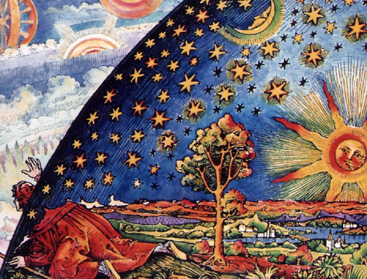


The present situation in cosmology echos some of the great debates in human history. Do we sit on a motionless earth, circled by the sun and other heavenly orbs? Or does the earth orbit the sun? Could our special home be just another rock orbiting an ordinary star? While the latter view is now taken as self-evident, it was initially unsettling.
How unsettling? Supporting the Copernical model famously got Galileo into trouble with the Inquisition. The Church didn't rescind his 1616 conviction as a heretic until 1992, though arguably he got off lighter than Giordano Bruno, who was burnt at the stake in 1600. We now routinely teach this episode in the history of science as the Copernican Revolution. Consider the etymology of the word revolution. Nowadays, we usually think of this in a political context: the Glorius Revolution, the American Revolution, the French Revolution, the Bolshevick Revolution... this list can go on indefinitely. The deep and drastic political connotations of this word come from astronomy, as in how planets revolve around the sun. It is hard to overstate the impact of these issues on our mental world view.
The situation in cosmology today is no less profound than in Galileo's time. Is our universe an unfamiliar darkness filled with invisible mass, with the "normal" matter of which we are composed no more than a bit of queer flotsam in a vast sea of dark matter and dark energy? Or is our inference of these dark components just a hint of our ignorance of some deeper theory?
Both possibilities have profound implications.
If the universe is not composed of the stuff we can see, what is it made of? Are we swimming in a sea of unfelt WIMPs whose ghostly presence is the real fabric of our universe? (Depending on the exact mass of the WIMP, there are a few hundred passing through your body at any moment.) Is the unverse doomed to a fate of utter darkness, with its accelerated expansion driven by Dark Energy to the point where all light fades outside our horizon?
Or are these dark components just figments of our Newtonian imaginations groping for a deeper theory? If the Law of Gravity is to blame, how does it change? What fate awaits the universe under the stronger long-range effect of MOND? Will it eventually recollapse rather than expand forever? What then?
General Relativity is so well tested, many scientists legitimately ask how can the law of gravity change? Unfortunately, the only data that test General Relativity on the scale of the mass discrepancy are the data that show the mass discrepancy. These could already be claimed as a clear contradiction to its predictions... that's why we have to invoke dark matter: to make up the difference.
Also at stake is the soul of the scientific endeavor. These are fundamental issues of the sort that attract our attention to science in the first place. The Big Questions. And yet, I find most professional cosmologists to be extremely reluctant to discuss these issues rationally, let alone objectively. No one likes to admit they were wrong, let alone admit some one else was right. There is a Nobel Prize waiting for whoever solves the mass discrepancy problem. There are many advocates of dark matter who would like to be the recipient of that prize; they sure don't want it to go to Milgrom and his far-out MOND theory.
Ultimately, what we want is irrelevant. Science is not a consensus endeavor: the data rule. The universe is doing what it is doing. It is our bussiness to figure that out, not tell it what it can and cannot do.
Personally, as a scientist well-schooled in cosmology and dark matter, I found it very difficult to consider MOND seriously. Having made the effort to do so, and being repeatedly surprised by how well it performs, I find it enormously frustrating how easily it is dismissed by my peers who have not attempted the same exercise. I remain faithful that eventually the truth will out - whatever it is! But I also fear for the soul of the scientific enterprise if we persist in ignoring the elephant in the room. Are we scientists able to follow the scientific method and admit we're wrong when the data say so? Or are we just middling priests of some Cold Dark Religion ushering in another millenium of epicycles?
| Also in Czech, | Russian, | Uzbek, | Portuguese, | Tatar (Kyrgyz), | Norwegian, | Bosnian, | Azerbaijanian, | Urdu, | and Spanish. |
